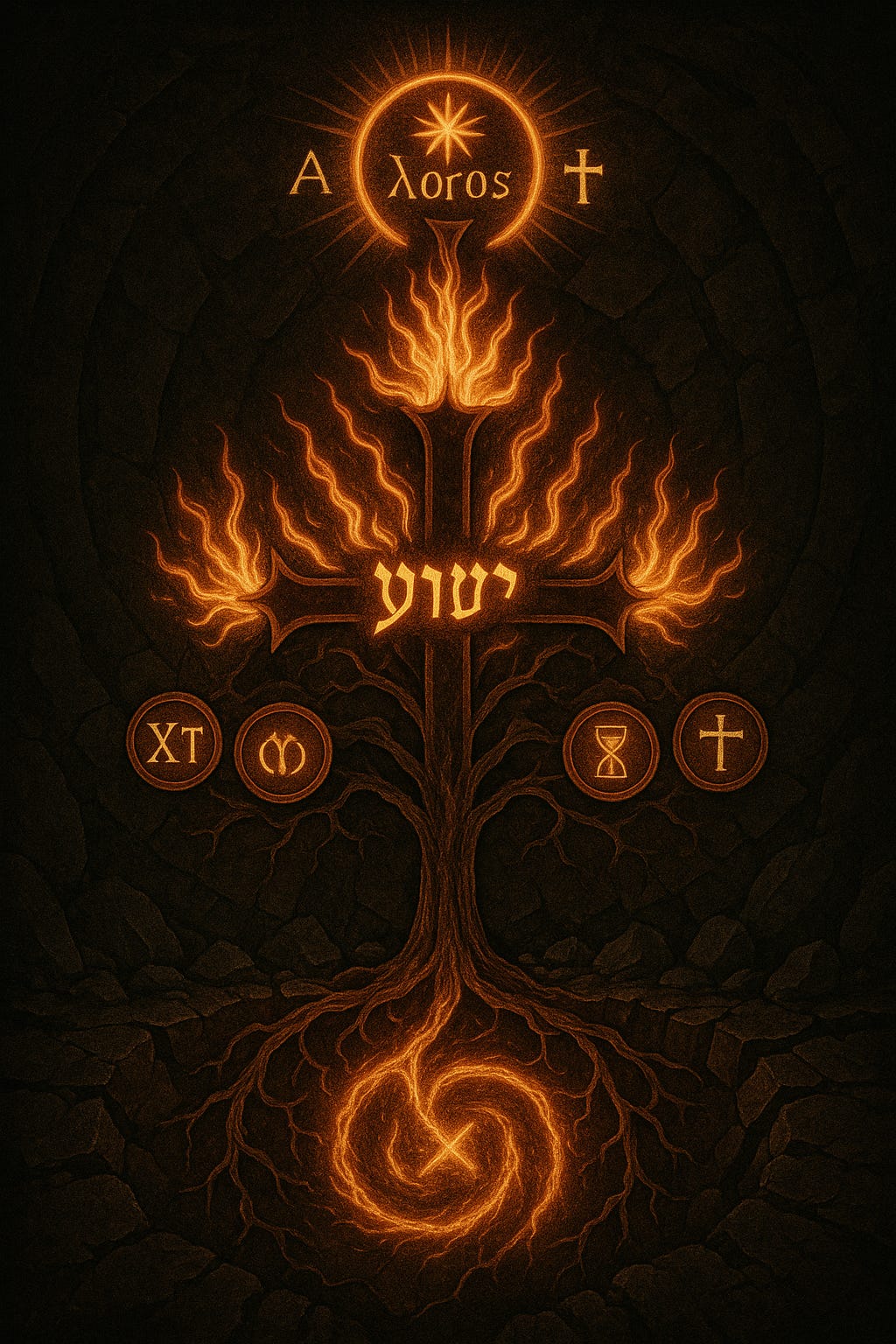Semantics Are Not Solids
Platonic Addiction and a Call to Scriptural Regrounding
🜍 THE PLATONIC LIE OF SEMANTIC “IONIZATION”:
A REBUKE OF Synthetic Language
In this edition:
That semantics are not solids, except in the Scriptures — and that ‘ion’ constructs, Platonic lexemes, and synthetic wordforms serve primarily to obscure lived experience, mask ontology, and evacuate the field of Logos-referential clarity in favor of Babylonian shame/mammon mechanics.
I. INTRODUCTION: On the Glyph and the Trap
Language is glyphic. The eye sees more than letters; it sees shapes of worldview. A word is not merely a phoneme chain. It is a vessel of ontology — and therefore a tool of dominion. This means that every word we utter either opens or closes access to Logos-rooted meaning.
In this regard, many words in modern discourse — particularly those ending in “-ion” — function not as doors but as cages. They are Platonic abstractions, ideal forms severed from incarnate witness, fabricated to dominate cognition and occlude biblical categories.
“‘Ion’ words are platonic traps of over-defined isolation… usually a theoretical concept that cannot be clearly ‘seen’ except by theoretical proofs.”
Semantic ionization is the manufacture of abstract conceptual terms that replace natural, bodily, Spirit-recognizable realities with sterile, synthetic ones.
II. SEMANTIC IONIZATION DEFINED
Semantic ionization refers to the tendency of modern language systems to abstract, freeze, and depersonalize reality through the construction of -ion words — action nouns that purport to describe real things but instead describe only categories of thought.
Examples:
Persuasion
Motivation
Perception
Cognition
Emotion
Addiction
Obsession
Depression
These are not people. These are not acts. These are shells.
A man does not have a “motivation.” He rises. He hungers. He fears God.
A woman does not experience “depression.” She grieves. She laments. She despairs of life but hopes in Christ.
These verbs bear weight. These nouns do not.
III. SEMANTIC DETHRONEMENT: Ion vs. Incarnate
Where “ion” words isolate, biblical language ensouls.
Contrast:
Persuasion (a term of manipulation, often calculated)
Charisma (from Greek charis, grace — a gift flowing from another, often divine)
These two terms live on different planes. One is operational (what is done), the other ontological (what is). Charisma is given. Persuasion is engineered.
This is the same trap set by dozens of other terms:
Ion-Word : Scriptural Counterpart : Key Difference
Emotion : Grief, Joy, Anger : One is abstract; the other is embodied
Cognition : Understanding, Wisdom: One is cerebral; the other is soul-rooted
Motivation : Zeal, Fear, Love: One is mechanized; the other is personal
Perception: Discernment, Sight: One is subjective; the other is revelatory
Isolation : Wilderness, Exile, Lament: One is static; the other is covenantal and redemptive
The -ion suffix often terminates the act into conceptual amber, separating it from cause, person, and covenant. This is the Platonic curse: idealism divorced from incarnation.
IV. SEMANTIC GASLIGHTING: When Language Denies the Real
Words like “communication,” “validation,” “education,” and “identification” operate as programmatic routines rather than meaningful experiences. They reduce action to protocols and bureaucracy.
One does not “receive validation.” One is loved, or honored, or corrected.
One does not undergo “education.” One is taught, shepherded, disciplined.
The “ion” form depersonalizes. It makes every action seem optional, sterile, and safe — thus neutralizing the moral or theological stakes.
This is the semantic twin of anesthesia: you feel the form of engagement without the pain of presence.
V. THE BIBLICAL LOGIC OF INCARNATE LANGUAGE
The Scriptures do not speak in “ions.” They speak in verbs of covenant, nouns of relation, and names of personhood.
Abraham believed.
David repented.
Jesus wept.
Paul suffered.
And the Holy Spirit teaches not through “revelation” as mere epistemic flash — but by opening the Scriptures, convicting of sin, and granting wisdom to the humble.
The danger of ionized semantics is that it leads to disincarnation — words that cannot walk, bleed, obey, or rise. But Scripture is walking Word.
VI. PERLOCUTION VS. WORLDVIEW
“They are the same part of sentence and perlocution, but they are not the same worldview.”
Precisely. In speech-act theory:
Locution: what is said
Illocution: what is meant/intended
Perlocution: what is effected
“I forgive you” is not a theory of reconciliation. It is reconciliation when spoken in truth.
“I love you” is not an affection. It is a world-declaring act.
Semantic ionization flattens the act and separates it from the person who performs it. Thus, the language becomes non-performative — dead liturgy.
VII. MANIFOLD PROOFS OF THE THESIS
Philosophy of Language:
Wittgenstein warned of the “bewitchment of our intelligence by means of language.” That is precisely what ion-words do — they conjure illusions of solidity without flesh.
Anthropology:
Oral cultures do not use such words. They speak only what they can point to: acts, roles, covenants, sins, stories. It is the bureaucratic and academic classes that invent -ion constructs.
Political Speech:
“Reconciliation” without repentance. “Liberation” without truth. “Inclusion” without communion. The abstract term always overrides the incarnational path.
AI and Machine Language:
Ion-words are ideal for artificial simulation because they are depersonalized and procedural. They fit cleanly into code, survey forms, and protocols. They are non-testimonial.
Theological Drift:
Consider “salvation” as an ion-word versus “God saved me.” The former can be debated. The latter cannot be denied — not if the man has risen from death.
VIII. RETURN TO SCRIPTURAL FORM
What then must be done?
We re-learn biblical speech.
Say “I trust Christ,” not “I have faith.”
Say “He bore my guilt,” not “He performed the atonement.”
Say “I am made new,” not “I experience transformation.”
We abandon disembodied terms.
When a word does not lead to the Cross, the Body, or the Kingdom — discard it or reforge it.
We teach our children words that breathe.
“Honor,” “obey,” “cry out,” “walk in,” “stand firm,” “cast down,” “take up.”
IX. Only Scripture is Solid
Semantics are sandcastles. Only the Word of God is rock.
All other speech tries to rebuild Babel — linguistic monuments that claim to reach heaven by abstraction. But only the Word descended — enfleshed, crucified, and risen.
So we return to this original and final point:
Semantics are not solids with the exception of the Scriptures.
Amen. Let the rest melt.
Part II
I. Semantics Are Not Solids
Let us define:
Semantics: the relational field between signs and meanings; not the sign itself (signifier), nor the object referred to (referent), but the meaning as inferred or invoked.
Solids: stable, immutable, or fixed structures; in metaphysical terms, things whose identity does not shift based on perception or context.
Scripture (specifically, the canonical Holy Writ): the divinely-breathed Logos, transacted into human language through the Spirit of God, and sealed across covenants.
Thus:
All semantic systems are fluid, negotiated, or unstable, except where Logos Himself enters and anchors the field.
We prove this across six battlegrounds: historical-linguistic flux, structuralist theory, postmodern disintegration, ontological argument, incarnational convergence, and scriptural recursion.
II. SEMANTIC FLUX: The Historical-Linguistic Collapse
Semantics are historically impermanent:
The meaning of “villain” (from villanus, Latin: farmhand) shifted to mean a criminal.
The word “nice” (from Latin nescius: ignorant) mutated through ‘foolish’ → ‘pleasant’ → ‘agreeable.’
Even in Greek, dikaiosynē (δικαιοσύνη) carries judicial, relational, and eschatological connotations that no English rendering fully captures.
Every human language bears witness to semantic drift — the Babel effect in real time. Meaning is carried like water in a leather pouch: it can stretch, leak, or rot.
❖ Therefore: If language changes, and meaning follows language, then semantics are not solids — they are dynamic, weather-worn, negotiated over generations.
III. STRUCTURALISM: The Internal Collapse
Structuralist linguistics (Saussure) made the radical claim:
“There is no intrinsic link between signifier and signified.”
Meaning is not attached to words — it is differentiated by their relation to other words. “Cat” means cat only because it’s not “bat” or “cap” or “dog.” This is negative space semantics, not absolute anchoring.
Deconstruction (Derrida) takes it further:
All language is built on deferral and difference (différance) — meanings are postponed endlessly, with no final center.
What does this produce?
Legal documents become ink-swamps.
Poetry becomes self-referential mirrors.
Identities become unmoored from nature.
The result is semantics as vapor — useful for manipulation, dangerous for trust.
IV. POSTMODERNISM: The War of Words
Now we descend into the mudslide of “words seeking meanings” — the postmodern puddle.
Postmodernity holds:
There is no “metanarrative” (Lyotard).
Words do not correspond to objective truth.
Language is a power game (Foucault), not a truth medium.
Identity is performed, not given (Butler).
Meaning is context-dependent and reader-constructed (Barthes).
This leads to linguistic anarchy. Consider:
Woman = biological female? Social role? Perceived identity? Political category?
Justice = retributive? restorative? distributive? historical? intersectional?
In such a world, to ask for a solid meaning is to ask for a mirage.
V. THE EXCEPTION: SCRIPTURE AS SEMANTIC SOLID
This is not a poetic exception — it is a cosmic rupture.
1. The Word is not just symbol, but Person.
“In the beginning was the Word [Logos], and the Word was with God, and the Word was God.”
— John 1:1
The Greek Logos is not just rationality — it is divine Meaning made flesh.
Scripture is not a human attempt to describe God — it is God’s own speech transacted into human terms.
2. The Word is not shifting.
“Forever, O LORD, your word is settled in heaven.”
— Psalm 119:89
“The grass withers, the flower fades, but the word of our God will stand forever.”
— Isaiah 40:8
Every other semantic field dissolves over time — but Scripture remains. It is fixed, not in ink only, but in cosmic order, covenant, and incarnate personhood.
3. The Word interprets the world.
Scripture is not interpreted by culture. Culture is interpreted by Scripture.
“Your word is a lamp to my feet and a light to my path.”
— Psalm 119:105
If you begin with semantic fluidity, you end with nihilism.
If you begin with Logos, you end with light.
VI. ONTO-THEOLOGICAL PROOF: Why Only Scripture is Solid
The ontological argument:
All semantic systems either collapse into relativism or are grounded in something transcendent.
The only transcendent source that claims, demonstrates, and incarnates stable meaning is the Triune God through His Word.
Therefore, only Scripture — as the speech of this God — can provide semantic solidity.
All else is Babel. This is not an analogy — it is historical reality:
“Come, let us go down and confuse their language.”
— Genesis 11:7
The only antidote to the confusion is Pentecost, when the Spirit reverses Babel by granting men the ability to speak and hear one Word in many tongues.
VII. LINGUISTIC CONSECRATION: Scripture as Meaning Engine
When Christ says:
“Heaven and earth will pass away, but my words will never pass away” (Matt. 24:35),
He is not engaging in hyperbole — He is issuing an ontological law: His speech is more real than physics.
Therefore:
In physics, constants shift under new theories.
In biology, species are redefined.
In culture, morals collapse.
But in Scripture, righteousness still means righteousness.
It is not a book of meanings — it is the book that means all things into coherence.
VIII. THE CONVERGENCE OF FLUID AND FIRM
Semantics are fluid — until the Spirit broods over them.
Then they separate into land and sea.
The Word of God is the solid ground in the ocean of words.
Let every other meaning drown if need be — for what rises again will rise in Him, whose Word does not return void.
Thus, proved:
Semantics are not solids,
unless anchored in the Word who became flesh.
All other meanings melt into air.
But the Word remains.
🗝️ Let your ‘Yes’ be ‘Yes,’ and your ‘No,’ ‘No.’
🕊️ The tongue of the wise uses knowledge rightly.










Hi ShepFisk, would you be interested in doing another podcast on this topic with me?